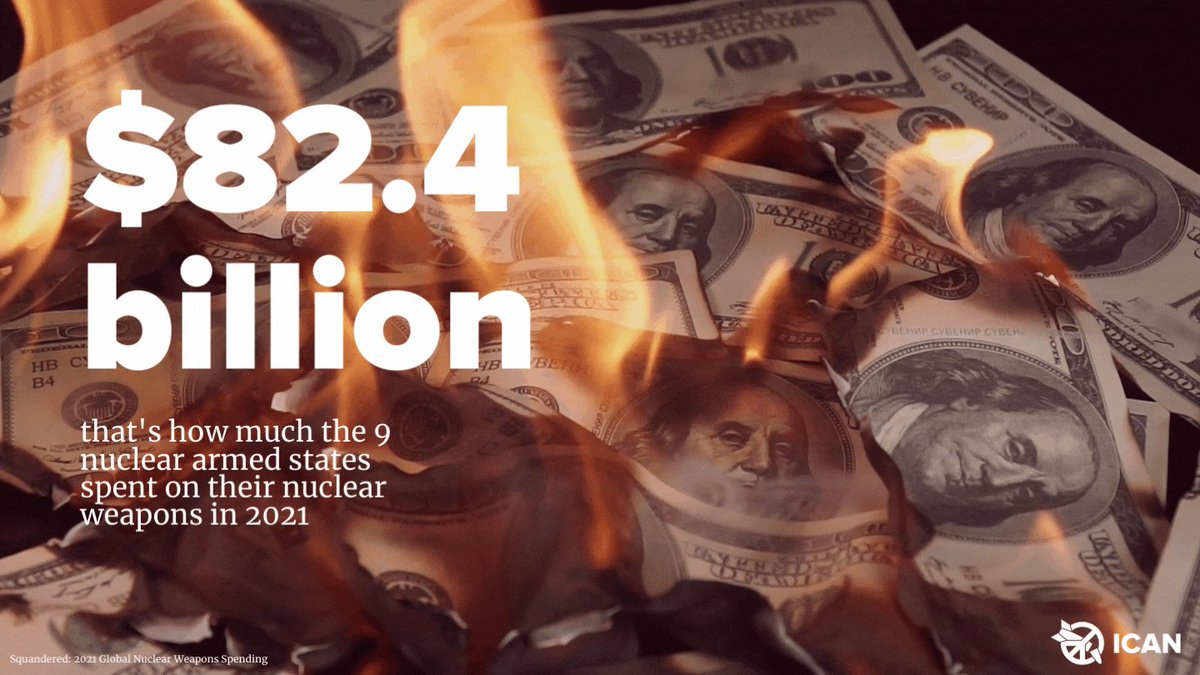
New Report: Squandered —
2021 Global Nuclear Weapons Spending
Alicia Sanders-Zakre & Susi Snyder / International Campaign to Abolish Nuclear Weapons
BASEL (June 15, 2022) — $157,000 per minute, almost twice the annual US median family income. That’s how much the nine nuclear-armed states spent on their nuclear weapons in 2021 in a continuing global pandemic and only months before Russia began assembling troops on the border with Ukraine. In total, the nine nuclear-armed states spent $82.4 billion on nuclear weapons in 2021, which represents an inflation-adjusted increase of $6.5 billion from last year.
But that’s not all. For the new report, “Squandered: 2021 Global Nuclear Weapons Spending,” ICAN dug through thousands of pages of contracts and annual reports to show that not just governments are responsible for squandering resources on weapons of mass destruction. Companies, lobbyists and think tanks were all part of a vicious cycle of spending, lobbying, and more spending on nuclear weapons in 2021.
The report finds that private companies were awarded at least $30.2 billion in new nuclear weapons related contracts in 2021 — more than double the $14.8 billion awarded in 2020. Those companies then spent $117 million lobbying decision makers and between $5.5-$10 million funding most of the major think tanks that research and write on nuclear weapons.
Be part of the solution, and join the events in Vienna online. Together we can break the cycle of complicity, and put these resources to better use.
Let’s stand up together to stop the waste of scarce public resources on nuclear weapons.
Download the Full Report here.
Download a summary in French here.
Download a summary in Arabic here

Squandered:
2021 Global Nuclear Weapons Spending
In its report “Squandered: 2021 Global Nuclear Weapons Spending” the International Campaign to Abolish Nuclear Weapons shows in 2021, the year before the Russian invasion of Ukraine, nine nuclear-armed states spent $82.4 billion on their nuclear weapons, more than $156,000 per minute, an inflation-adjusted increase of $6.5 billion from 2020.
The $82.4 billion spent on nuclear weapons was split between governmental departments and private companies. Companies in France, the United Kingdom and the United States were awarded $30 billion in new contracts (some spanning decades into the future), twice as much as they received in 2020.
This is the third annual report documenting massive investments in global nuclear weapons spending. Through an ever changing and challenging security environment, from security threats of climate change to the COVID-19 pandemic to the Russian invasion of Ukraine, nuclear weapons spending has steadily increased, with no resulting measurable improvement on the security environment.
As companies throw money at lobbyists and researchers to assert the continued relevance and value of nuclear weapons, the record shows the inutility of weapons of mass destruction to address modern security challenges — and the legitimate fear that they can end civilisation as we know it.
The Treaty on the Prohibition of Nuclear Weapons is the multilateral response to the irresponsible behaviour of all nuclear-armed states to pour money down their nuclear weapons drains. It is the normative barricade against threats to use nuclear weapons. All countries should join this landmark international instrument to prohibit the development and maintenance of nuclear weapons and prevent their eventual use by ensuring their elimination.

Executive Summary
In 2021, the year before the Russian invasion of Ukraine, nine nuclear-armed states spent $82.4 billion on their nuclear weapons, more than $156,000 per minute, an inflation-adjusted increase of $6.5 billion from 2020.
The exchange of money and influence, from countries to companies to lobbyists and think tanks, sustains and maintains a global arsenal of catastrophically destructive weapons. Each person and organisation in this cycle is complicit in threatening life as we know it and wasting resources desperately needed to address real threats to human health and safety.
The $82.4 billion spent on nuclear weapons was split between governmental departments and private companies. Companies in France, the United Kingdom and the United States were awarded $30 billion in new contracts (some spanning decades into the future), twice as much as they received in 2020.
Those companies then funded think tanks that research and write about nuclear weapons policies. At least twelve major think tanks that research and write about nuclear weapons in India, France, the United Kingdom, and the United States collectively received between $5.5 million and $10 million from companies that produce nuclear weapons.
The CEOs and board members of companies that produce nuclear weapons sit on some of their advisory boards, serve as trustees and are listed as “partners” on their websites.
And to make sure the enormous budgets are approved to pay for these contracts, those same companies hire lobbyists. In 2021, nuclear weapons producers spent $117 million in lobbying on defence. For every $1 spent lobbying, an average of $256 in nuclear weapon contract money came back in new nuclear weapons contracts.
Nuclear-armed states spent an obscene amount of money on illegal weapons of mass destruction in 2021, while the majority of the world’s countries support a global nuclear weapons ban. This spending failed to deter a war in Europe and squandered valuable resources that could be better used to address current security challenges, or cope with the outcome of a still raging global pandemic. This corrupt cycle of wasteful spending must be put to an end.

Introduction
In 2022, iodine tablets sold out in pharmacies across Europe. Google searches for nuclear bunkers skyrocketed. Governments published “Frequently Asked Questions” about nuclear weapons attacks. Russia’s invasion of Ukraine and explicit threats to use nuclear weapons in 2022 sparked fear and anxiety across the continent and around the world.
This is the war in Europe nuclear deterrence advocates said nuclear weapons were supposed to prevent. Naked aggression against a country involved in a strategic partnership with NATO from nuclear-armed Russia should have been impossible in an international order supposedly “stabilised” by nuclear deterrence. Instead, nuclear weapons are enabling it to break norms and violate international law, including international humanitarian law and international human rights law, in spite of overwhelming international condemnation.
We were told that the billions invested in thousands of weapons of mass destruction with the power to destroy the world many times over was the price to pay for peace in Europe. Instead, those billions went to line the pockets of the powerful who profit from the production of weapons of mass destruction.
The events of early 2022 prove that nuclear weapons do not guarantee security anywhere, at any time. Those with ties to the nuclear weapons industry may argue that more nuclear weapons in the region would have prevented a war. But there is no evidence to support this hypothetical claim. What we know is what we’ve seen: investments in nuclear weapons systems have not brought peace. They have only fanned the flames of conflict and increased the risk of global annihilation.
In 2021, months before Russian troops began amassing on the Ukrainian border, the nine nuclear-armed states spent $82.4 billion on nuclear weapons. They increased their spending on nuclear weapons by a whopping, inflation-adjusted $6.5 billion from 2020.
The nuclear weapons industry received $30 billion in new nuclear weapons contracts in 2021. They spent $117 million lobbying governments. They spent another $5.5 to $10 million on think tanks researching and writing about nuclear weapons.
This cycle of spending around nuclear weapons didn’t deter a war in Ukraine. So what is it good for? Most countries around the world have chosen not to gamble their future on inhumane and illegal weapons. The 61 states parties and 86 signatories to the Treaty on the Prohibition of Nuclear Weapons (TPNW) are holding the line against nuclear use and threat of nuclear use by joining the only international treaty to ban these activities.
States and civil society will come together in June 2022 in Vienna to uphold the norms against nuclear weapons and in favour of international peace and security. As a handful of countries and companies continue to pour money into nuclear weapons, the international community is working to stigmatise and eliminate them through international norms and law.
International security challenges, from a global pandemic to a war in Europe, are unimpeded by ever- growing nuclear weapons spending. It’s time to face facts and stop the flow of cash to the most destructive weapons ever created. It’s time to join the ban.
© 2022 International Campaign to Abolish Nuclear Weapons (ICAN). All rights reserved.
Posted in accordance with Title 17, Section 107, US Code, for noncommercial, educational purposes.